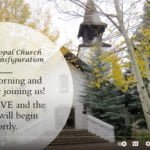All Saints enjoys some spectacular hymnody! Two of my favorites are I Sing a Song of the Saints of God and For All the Saints.
Lesbia Lesley Scott (1898-1986) penned Sing to entertain and teach her three young children more about All Saints Day. Evidently it was a lifetime conundrum to her that this hymn rocketed to great popularity in America as she and her kids didn’t think it her best. I disagree! Ironically it was never included in the popular Anglican (English) hymnal but Sing’s inclusion in the American The Hymnal 1940 brought widespread usage on our side of the pond. You may remember Sing’s tune was composed by the Reverend John Henry Hopkins (1861-1945), the grandson namesake of an earlier Hopkins who penned We Three Kings (and who served on The Hymnal 1940’s selection committee…helpful!). Hopkin’s playful tune matched to Scott’s very Brit upper-crusty stanzas produced one of the few Anglican hymns simultaneously both fun to sing and educational in equal measure. While some authorities turn their nose up judging this beloved hymn to be irreverent, a Methodist church leader characterized the Methodist tradition to be sustained by Methodist woman who toiled and fought and lived and died for the Lord they loved and knew. Here here!
The Right Reverend William Walsham How (1823-1897) penned over 60 hymns, of which Saints is by far the most enduring. Bishop How is a total Anglican package, lovingly nicknamed the Children’s Bishop and the Poor Man’s Bishop. He served the destitute in London’s notorious slums (where Charles Dickens earned his literary chops) while writing treatises seeking to reconcile evolution with the biblical accounts of creation. And he wrote music too! Wow! The tune, Sine Nomine, (literally without name in Latin) was penned by the incomparable Ralph Vaughan Williams (1872-1958), and that’s pronounced “Raafe” or else you must return your Colorado Public Radio classical music CD of Andrea Bocelli’s Christmas in…somewhere! How’s words merge with William’s soaring, driving parade music to create a transcendent, victorious hymn so uplifting to sing. Thank God The Hymnal 1982 editors decided to not include all 11 original verses in our American rendition, but the 8th verse is sadly omitted, a treasure I think:
- And when the strife is fierce, the warfare long, Steals on the ear the distant triumph song,
And hearts are brave, again, and arms are strong. Alleluia, Alleluia!
As today is my final devotional on church music, I conclude with great gratitude for the astonishing creativity and sheer musical prowess displayed by each and every hymnist, musician and lyricist we’ve met together. Their musings marinated in their faith has provided us with the finest music in the English language, not to mention theological brilliance encapsulated in short stanzas of transformational power. And to align these works alongside or within each church season is simply a remarkable ecclesiastical achievement. It’s humbling to remember that long before the common household contained printed manuscripts of any bible or Book of Common Prayer, our Christian forebears internalized their scripture through architecture, stained glass, musical instrument and vocal performance. Those who sing really do pray twice!
- Sing the way it was intended to be heard. I wonder how may times that unfortunate adult lay reader to the right has apologized for his conduct during this performance?! Probably not enough….
- Saints the way it was intended to be heard. Sometimes those extra verses do come in handy! Advance to about 6:19 to hear the stirring soprano descant crescendo.

